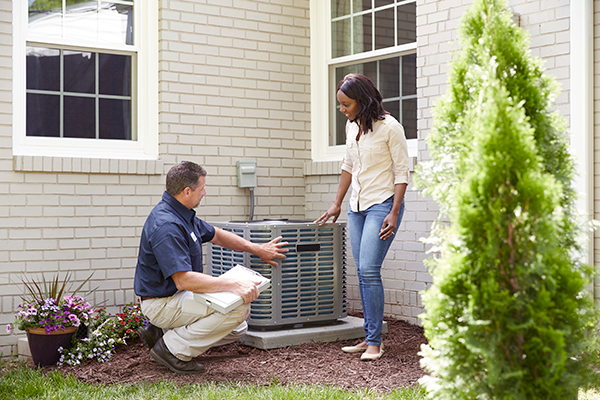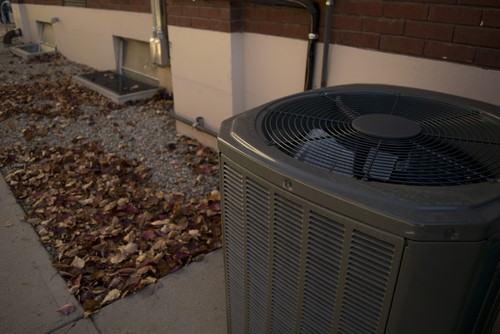Although it may seem counterintuitive for an air conditioner to freeze, it can and does happen to many unprepared homeowners every year. A frozen air conditioner can leave you and your household in an uncomfortable situation on a hot day. If you think you have a frozen AC, here’s how to fix it, and prevent it in the future.
What Causes Your Air Conditioner to Freeze?
It’s important to understand several factors can lead to your air conditioner freezing up:
- Dirty air filter
- Dirty evaporator coils
- Leaking refrigerant
- Problematic parts and other issues
How to Tell if Your AC is Frozen
The first red flag that your air conditioner may be frozen is that your system isn't reaching the desired thermostat setting. You may notice this more quickly in an upstairs area of your home. If your air conditioner isn’t cooling your home properly, place your hand over one of the supply registers and feel the air coming out. If the air feels warm instead of cool, turn off the system and open or unscrew the access panel to the evaporator (check your manufacturer’s system diagram for the evaporator location). If you notice that you have frozen AC coils, or any of the equipment or panels are encased in ice, then your system’s refrigerant may have fallen below 32 degrees, resulting in a frozen AC.
Related: When to Replace Your AC
How to Thaw a Frozen AC System ?
In many cases, you may be able to defrost the ACunit yourself. You should avoid running the air conditioner if you think it's frozen because this can place a strain on the compressor and possibly damage it. Before getting started, find your electrical breaker box and turn off the switch that controls power to your air conditioner, this will help your AC begin to ‘thaw’, which could take up to 24 hours. It’s best not to try to clear the ice by hand which could also damage AC components. Once the condenser and coils have thawed, remove any standing water that may have pooled around the equipment.
After the system is thawed, you’ll need to dry the coils. If you haven’t yet turned on the system’s blower, restore power to the system if needed, and set the thermostat control to operate the blower or fan only. This will help circulate air through the system and coils. You may also be able to speed up the process with a hair dryer set on low heat. Just take care not to use high heat or to get the hair dryer too close to the coils which could possibly crack them.
Related: Simple Fixes For Some Top Air Conditioner Problems
4 Ways to Fix a Frozen Air Conditioner
While a frozen air conditioner can be caused by different things and may require the expertise of a qualified HVAC technician to fix, there are some things that you can try yourself first before an HVAC replacement.
1. Remove debris from coils and cooling fins
Check the vent filters to see if they are clogged and restricting air flow. Dirty filters can cause an air conditioning system to freeze. If they look dirty or discolored, change them and see if that fixes the problem.
2. Inspect the Coils and Fins
You can also inspect the coils and cooling fins around the evaporator to see if they need cleaning. If so, use a soft brush and gently remove any dust or debris. Check to see if all the supply registers in your home are open in each room, too. Blocked registers may restrict air flow which can affect the evaporator temperature and cause problems.
3. Restore coolant levels
Low coolant can also affect your AC system’s pressure and cooling efficiency, causing the unit to freeze. To check on your system’s refrigerant levels and correct the levels, get a coolant installation kit at your home improvement store. If you suspect that you have a refrigerant leak in your system, call an HVAC service professional.
4. Reset the Power
After you’ve taken steps mentioned above to thaw and correct your frozen AC system, run a test to see if it’s cooling properly again. If you’ve shut the breaker off, restore power and turn the thermostat to the cool setting. After a few minutes, you should be able to feel cool air blowing from the vents. If the air is still warm or if the system cycles for a long time without reaching the desired thermostat setting, there may be additional damage to the unit or a refrigerant leak, and you’ll need to call a qualified HVAC technician for help.
Related: Noises Your Air Makes and What They Might Mean
A great way to prevent unexpected repair costs from ruining your day is to make sure you have a home warranty from American Home Shield. Our home warranty plans cover the home systems and appliances you rely on everyday - like your air conditioner, heating system, ductwork, refrigerator, washer and dryer, and more. When a covered breakdown occurs, all you have to do is place a service request and we’ll assign a Pro to diagnose and repair the item for you.





